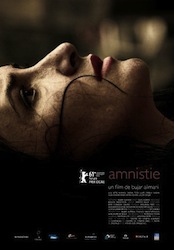Posts in this series:
Raindance 2011- Another Earth to open Raindance
- 18 World Premieres at Raindance
- Festival Preview: 10 Unmissable Raindance Films
- Another Earth
- Interview – Raindance Founder, Elliot Grove
- Skinning (Šišanje)
- Black Pond
- Fambul Tok
- Interview – Fambul Tok Producer, Libby Hoffman
- Hollow
- Amnesty (Amnistia)
- How To Start A Revolution
- Mesocafe
- By Day and By Night (De Dia y De Noche)
- The Box
- Victims
- Interview – Leaving Baghdad Director, Koutaiba Al-Janabi
- Leaving Baghdad
- Bonsai
- Face to Face
- The Ballad of Des and Mo
- Forget Paris
- No Return (Sin retorno)
- Holy Rollers
- The Wedding Party
- War Games
- Scenes of a Crime
- The Fifth Commandment (El Quinto Mandamiento)
- State of Emergency
- Top Ten: Raindance Films
Released: 2011
Director: Buyar Alimani
Starring: Luli Bitri, Karafil Shina
A slow-burning portrait of love amid bleakness
The Raindance Film Festival is exposing me to films that most people would never normally choose to go and see. Not because they aren’t worth seeing but because they would never have come onto their radar, not being amongst the blockbusters showing at the local multiplex. I suppose that’s the whole point of festivals like Raindance – to make sure that films that would not usually find an audience are seen. This is the case with Amnesty, a slow-burning love story from Albania.
 The film begins with strangers Elsa and Spetim being told (separately) that a new law has been introduced allowing them monthly conjugal visits with their imprisoned spouses. Each month they come to the prison for these visits and one time meet by chance. Slowly, very slowly, they fall in love and begin an affair which helps both of them to escape the bleakness of their lives and regain their own sense of self. Their growing happiness is then threatened when the government announces an amnesty and hundreds of prisoners are freed from jail.
The film begins with strangers Elsa and Spetim being told (separately) that a new law has been introduced allowing them monthly conjugal visits with their imprisoned spouses. Each month they come to the prison for these visits and one time meet by chance. Slowly, very slowly, they fall in love and begin an affair which helps both of them to escape the bleakness of their lives and regain their own sense of self. Their growing happiness is then threatened when the government announces an amnesty and hundreds of prisoners are freed from jail.
The first thing you notice is time. Despite lasting only 83 minutes the film seems to take an eternity to bring the protagonists together. Several months go by without much of interest happening to either character. The power of the slow-burn only comes to the fore in the final ten minutes or so of Amnesty. It’s only then that you realise how much you’ve come to care for the characters and become invested in their fate.
The second main feature of Amnesty is how bleak a picture it paints of life in Albania. This is not a film that the tourist board will want people to see. It certainly won’t encourage anyone to pop off on a city break to Tirana. The use of muted colours emphasises the dullness of the situation and works exceptionally well.
The fact that we become so attached to the characters is almost entirely due to the acting of Luli Bitri and Karafil Shina as the central couple. Both give subtle performances which always seem completely real and believable. The supporting cast isn’t that great and I think the worst child actors in Albania were picked to play Elsa’s sons. The script is sparse and the performances understated. It is this low-key approach which gives the film its power which really only hits you when the final credits roll.
One of the aspects of the storytelling I was most impressed with was the representation of the spouses. Their imprisonment dominates and controls the lives of of the major characters yet they remain faceless and for the most part voiceless. Even in the sex scenes there is no connection (other than physical) between the married couples. I liked this a lot – it helped to further illustrate the emptiness of Elsa and Spetim’s lives.
This is a film which takes its time to build empathy for the characters and fully flesh out their situation. It’s a lovely piece of storytelling but you’ll need patience to see it all the way through.
The Balkan strand has been funded by ‘Southeast Europe: People and Culture’ courtesy of the European Commission DG for Enlargement.


I have to admit I may not have the patience to see this, though slow-burn love stories can be intriguing. Glad to hear you’re seeing films you otherwise won’t outside of a film fest, I did so too when TCFF was happening a couple of weeks ago.
That’s one of the reasons I was so keen to get along to lots at Raindance. There’s no independent cinemas very close to me so I normally only ever get the choice of what’s on at the multiplex. It’s a real shame that some of these films won’t be seen by larger audiences as they are very good.